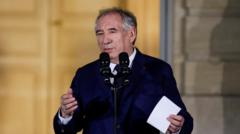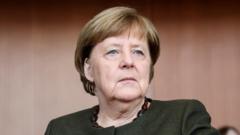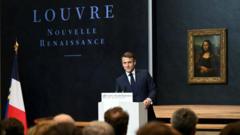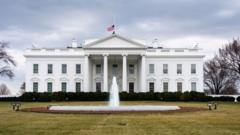François Bayrou's appointment as France's new prime minister marks a pivotal moment as the country grapples with significant challenges including a rising deficit and public dissatisfaction. Bayrou, noted for his centrist stance and leadership of the MoDem party, enters the role amid hopes of restoring political stability after the recent turmoil that led to Michel Barnier's short-lived administration.
New Challenges Ahead for France as François Bayrou Takes the Helm as PM

New Challenges Ahead for France as François Bayrou Takes the Helm as PM
Macron’s newly appointed prime minister, François Bayrou, faces the daunting task of addressing France's financial struggles amid political upheaval.
In his inaugural speech, Bayrou zeroed in on his commitment to tackling the looming issues of deficit and debt, which he deems a moral obligation to future generations. He acknowledged the "Himalayan task" at hand and emphasized transparency and diligence in approaching France's financial situation, which is projected to see a deficit of 6.1% of GDP this year.
His predecessor Barnier was ousted after only nine days, a testament to the fractious political environment that has plagued the current administration since Macron's snap elections. The new prime minister's mission now includes rallying support among divided political factions to prevent a repeat of this instability, especially with threats of a no-confidence vote from the far-left France Unbowed (LFI).
Despite bipartisan praise from various quarters for Bayrou's assumption of office, the political road ahead appears rocky. Key players like Socialist leader Olivier Faure have voiced concerns that the ongoing situation is akin to a "bad movie," while expressing readiness to engage but refusing to join his government.
In a recent opinion poll, 61% of voters expressed their apprehension regarding the political climate. While Bayrou's centrist rapport may provide a potential bridge between factions, the challenge remains whether he can create an actionable consensus without being undermined by the far-left or the far-right.
As the new government prepares for a significant budget bill and strives to unify diverse political interests, all eyes will be on Bayrou's leadership and the long-term implications for France’s governmental trajectory.
Bayrou has inherited not just the office but also a landscape filled with pronounced political divides and urgent economic matters that will require deft navigation in the weeks and months to come.
His predecessor Barnier was ousted after only nine days, a testament to the fractious political environment that has plagued the current administration since Macron's snap elections. The new prime minister's mission now includes rallying support among divided political factions to prevent a repeat of this instability, especially with threats of a no-confidence vote from the far-left France Unbowed (LFI).
Despite bipartisan praise from various quarters for Bayrou's assumption of office, the political road ahead appears rocky. Key players like Socialist leader Olivier Faure have voiced concerns that the ongoing situation is akin to a "bad movie," while expressing readiness to engage but refusing to join his government.
In a recent opinion poll, 61% of voters expressed their apprehension regarding the political climate. While Bayrou's centrist rapport may provide a potential bridge between factions, the challenge remains whether he can create an actionable consensus without being undermined by the far-left or the far-right.
As the new government prepares for a significant budget bill and strives to unify diverse political interests, all eyes will be on Bayrou's leadership and the long-term implications for France’s governmental trajectory.
Bayrou has inherited not just the office but also a landscape filled with pronounced political divides and urgent economic matters that will require deft navigation in the weeks and months to come.























